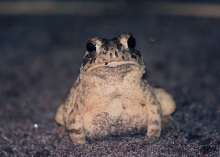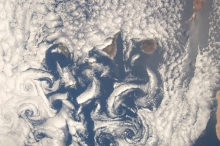El Niño will be a major contributing factor to how the season ahead plays out. El Niño has a reputation for bringing mild winters to much of Canada and it appears that this winter will feature one of the strongest El Niño events on record. So, can we expect a mild winter across the country this year? The answer is not so simple. (The Weather Network)


A Solvathon at the Bieler School of Environment, McGill University
Keynote speakers: Kim Stanley Robinson and Annalee Newitz
October 12-13, 2023
Every year, patches of Australian forests are consumed by fire, an ecologically necessary process that releases soil nutrients and stimulates plant growth. When the fire season is exacerbated by drought and high temperature, however, the devastation is so great that some citizens are forced to flee their homes. In the most extreme circumstances, natural habitats are ruined completely, even to the point of species extirpation.

McGill University is committing to achieve carbon neutrality by 2040, under its new Climate & Sustainability Action Plan (2017-2020), released today.

Unseasonably warm September could be cause of slight delay in leaves changing colour, McGill professor says. According to Jim Fyles, a forest ecology professor and director of the Morgan Arboretum, our city's trees have remained green a bit longer due to higher-than-average temperatures.
"One of the biggest icebergs on record has broken away from Antarctica, scientists said on Wednesday, creating an extra hazard for ships around the continent as it breaks up." (CBC)
In generations past, most water operators gained employment straight out of high school; however, these days, operators are required to have a strong foundation in science, engineering, and technology.

Much of the influence on climate from air pollution in East Asia is driven by consumption in the developed countries of Western Europe and North America, according to research co-led by McGill University atmospheric scientist Yi Huang.
In a paper published online this week in Nature Geoscience, Huang and colleagues from China, the U.S. and U.K. report that international trade shifts the climate impacts of aerosols -- solid or liquid particles suspended in air -- from net consuming countries to net producing countries.

24-year study of spring emergence of Fowler’s Toads creates model for predicting climate-change effects
The ability to predict when toads come out of hibernation in southern Canada could provide valuable insights into the future effects of climate change on a range of animals and plants.
“With the wind at his back from Paris and a fresh mandate from Canadians, Mr. Trudeau meets provincial and territorial leaders in Vancouver this week to pursue a national climate strategy.” (The Globe and Mail)

The 2015 United Nations Climate Change Conference, COP 21, will be held in Paris from November 30 to December 11.

McGill-led team developing new ways of tracking adaptation

A McGill University-led group of researchers (TRAC3) are looking at whether progress is being made in designing initiatives and policies to reduce vulnerability to climate change across countries. Their aim is to contribute new ways of monitoring the global climate adaptation process.

The atmosphere is so unstable that a butterfly flapping its wings can, famously, change the course of weather patterns. The celebrated “butterfly effect” also means that the reliability of weather forecasts drops sharply beyond 10 days.

Weather, which changes day-to-day due to constant fluctuations in the atmosphere, and climate, which varies over decades, are familiar. More recently, a third regime, called “macroweather,” has been used to describe the relatively stable regime between weather and climate.
